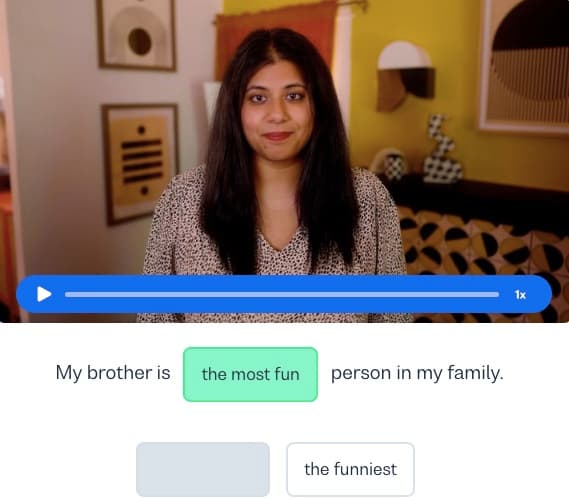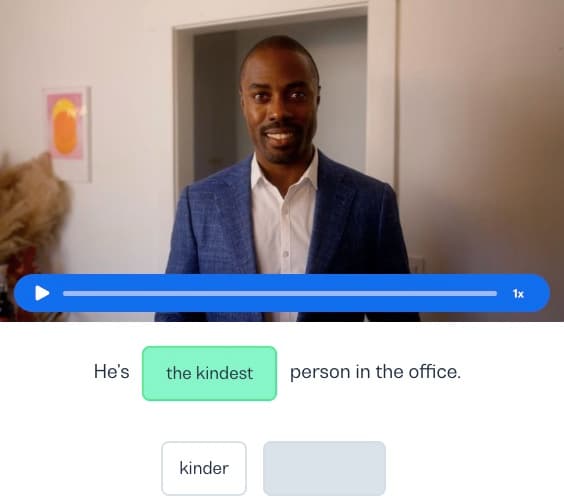I want to learn...
Author:

Chiara Pegoraro
It might happen one day that you find something that isn’t just interesting, cute and cool but the most interesting, cutest and coolest thing in the world! To express this quality, to underline that something is in some way remarkable, you need to use a superlative. Or it could be at least more interesting than something else... In this article we will see how a superlative or a comparative is built in English, the most common exceptions and some other rules you might want to pay attention to. Let’s go!
Comparatives and superlatives
Comparatives and superlatives have a lot in common, when a word has an irregular form for a comparative, it will have an irregular form for the superlative as well.
Aside from the way that they are formed, comparatives and superlatives differ in what they refer to. Comparatives refer to two things while superlatives are used to compare one thing to a potentially unlimited number of other things.
* Sarah is taller than Hannah. (comparative)
* Sarah is the tallest girl that I have ever met. (superlative)
In the first case we have two terms of comparison (Sarah and Hannah), in the second case we have the very tall Sarah on one side and every other girl I have ever encountered on the other side.
Let’s see a few more examples.
Examples of comparatives
A lion is faster than a cat.
A Porsche is more expensive than a minivan.
I am more patient than you are.
The coffee in this cafè is tastier than the one at our office.
The winter in Canada is colder than the winter in California.
As you can see the second term of comparison could be something completely different like a cat compared to a lion, but also something that can be possessed in different quantities, like patience. We can also compare the exact same thing, winter for instance, but we can highlight the very obvious fact that in Canada winter is colder than in California.
We can also notice that the second term is always introduced by the word than. A common spelling mistake is to mix up the word “than” and the word “then” that has a completely different meaning.
Examples of superlatives
New York is the biggest city in the United States.
Carlos is the smartest student in his class.
This is the cutest baby that I have ever seen.
Mount Everest is the tallest mountain in the world.
Here we can have the best pizza in town.
In the case of superlatives, the second term of comparison can be a wide variety of things. It can be a relatively small group (a class, a town) or it can include a larger space (the United States, the world) or even refer to something that I experienced in the past (that I have ever met). You might also have noticed that superlatives are always preceded by the article “the”.
Now that we are clear on what are superlatives and comparatives, let’s move on and answer the question: how do we make them?
The shortest way to make a superlative (or a comparative)
In most cases it’s very simple, you just have to add -er to a word and you will have a comparative or -est to have a superlative. Let’s see a few examples from some of the most common words in English.
The -er, -est forms
| Adjective | Comparative | Superlative |
|---|---|---|
| new | newer | the newest |
| old | older | the oldest |
| great | greater | the greatest |
| large | larger | the largest |
| cold | colder | the coldest |
| fast | faster | the fastest |
All these words are just one syllable and they all have an -er, -est form. You always need to rely on pronunciation to determine if one word has one syllable or not, because there are a number of English adjectives that have a silent final vowel. Large, safe, cute, pure are all one syllable and then they form comparatives and adjectives with -er and -est.
Since English is not made up only by monosyllabic words, then, how do we make a comparative from a word that has two or more syllables?
Let’s look at the table and find out!
Comparatives and superlatives with more and most
| Adjective | Comparative | Superlative |
|---|---|---|
| interesting | more interesting | the most interesting |
| important | more important | the most important |
| serious | more serious | the most serious |
| beautiful | more beautiful | the most beautiful |
| complicated | more complicated | the most complicated |
| dangerous | more dangerous | the most dangerous |
As you can see, adjectives that have two or more syllables need to have an extra word. That will be more for comparatives and most for superlatives.
So, the main rule regarding comparatives and superlatives will be: One syllable? -er and -est forms. Two or more syllables? More and most.
Exceptions
This rule has very few exceptions as we will see right now.
Most important variations in spelling
| Type | Adjective | Comparative | Superlative |
|---|---|---|---|
| Ends in -e | safe | safer | the safest |
| Ends in -y | happy | happier | the happiest |
| Ends in vowel + consonant | big | bigger | the biggest |
As you can see there are a few changes that can happen to a word when it becomes a comparative or an adjective. First of all, adjectives ending in -e will only have one “e” when adding -er, so we will have: larger, safer, cuter and so on.
An ending in -y will become an -i before -er and -est, so we will have: happier, easier, heavier.
Another change happens with words that end with a consonant preceded by a vowel. This combination will make the vowel to double when we add the forms in -er or -est, like in: bigger, hotter, sadder.
To conclude this section we need to remember that there are a few irregular adjectives that have a different form altogether:
Irregular adjectives that have a different form
| Adjective | Comparative | Superlative |
|---|---|---|
| good | better | the best |
| bad | worse | the worst |
| far | farther / further | the farthest / the furthest |
| little | less | the least |
Some of these might look familiar because of their extensive use. Let’s notice that both farther/ further and farthest / furthest are correct and can be used and the choice often depends on the context and regional variations in English. There are also a few expressions that would only work with further: for further information, further education, I’m not going to discuss it any further.
Considering this, “further” might be a more common option.
Exceptions to the regular form end here but there is just one little rule that you might want to consider.
When NOT to use “the” in a superlative
We have said that superlatives like the best, the most beautiful, the smallest always have the article “the”. This is true but with one notable exception. You don’t need to worry because this exception is so common that you probably already heard a few of these examples.
Andy is my best friend.
His biggest achievement was graduating with honors.
The Beatles’ most famous song is “Yesterday”
Grandpa’s most cherished possession is his vintage car.
As you can see, in all of these cases we have either a possessive adjective (my, his) or another indication of possession (The Beatles’, Grandpa’s). In all of these cases we cannot use “the” before the superlative.
Wrapping up
You now know all you need to know about comparatives and superlatives. How to use the -er/-est forms, when you need to use more or most and also all the exceptions.
If you think that this was useful, you should really see what Busuu can offer. Hundreds of easy and fun lessons that will help you not only to memorize vocabulary but that will also help you build your own understanding of English grammar. Sign up now and let the learning continue!
AUTHOR

Chiara Pegoraro
Newlanguages


